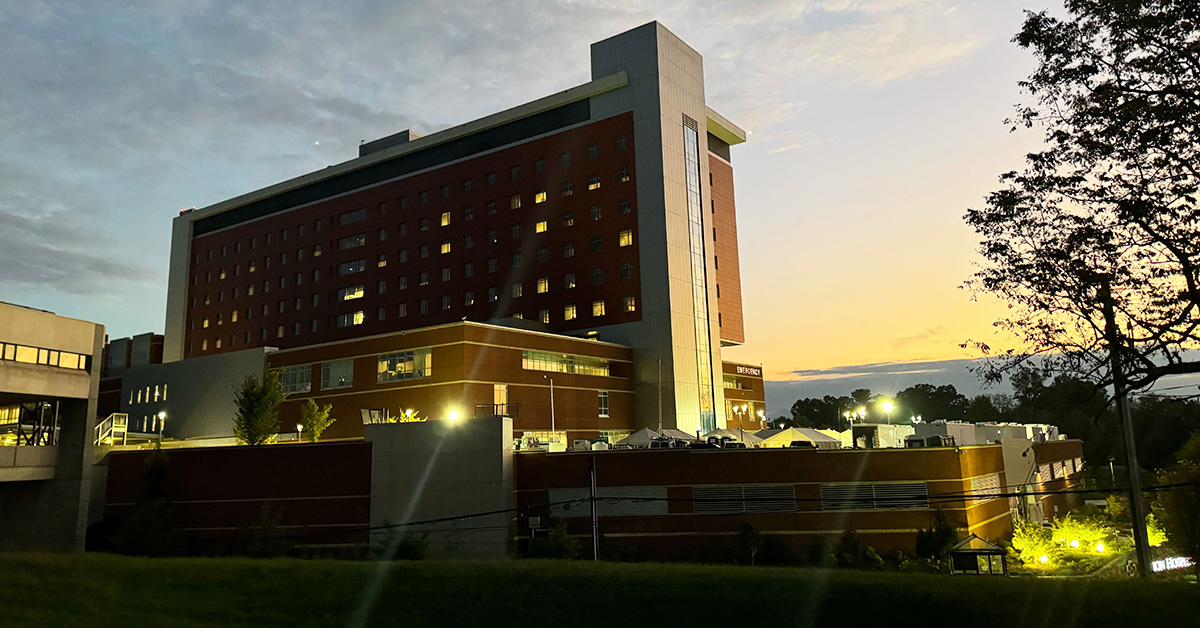Blog
Caring after Helene: dispatches from Asheville

“I feel like I am in the middle of living a nightmare. It is indescribable. Everything you see on the news, it is worse in person.”
That’s how Hannah Drummond, an emergency department RN and chief nurse rep at Mission Hospital in Asheville, N.C. described the devastation Hurricane Helene wrought on the nurses’ tight-knit community, where her workplace is the main medical facility. News reports say more than 200 people have died so far from the disaster.
Drummond and as many of her RN coworkers as possible all showed up Thursday at the hospital in anticipation of staffing needs through the hurricane. The nurses hunkered down at the hospital and slept there while torrential rain and winds pummeled their area late Thursday night through Friday.
Registered nurse Huns Brown, who has lived through plenty of Florida hurricanes and was not normally impressed by the severity of tropical storms in North Carolina, had a different reaction this time when he looked out the hospital window. “I was not expecting this,” said Brown. “I said, Okay, this is much windier. I could see [areas] flooded. I could see power lines down. This was something else.”
In the early morning hours of Friday, nurses reported the hospital lost power, computers for charting, and switched to back-up generators for essential equipment. They lost running water on Friday, as well as cell phone service. When the computers and phones went down, they lost all contact with the outside world.
“That was the stressful part,” said Brown. “The three days I was at the hospital, I had no communication with my family.”
By late Saturday, RN Shelby Runkles noted with irony that “it was a beautiful day outside the windows.” But inside the hospital, the nurses were managing barely controlled chaos. The emergency room, which has 100 beds, was accommodating double that census with two patients per room, and dozens more coming in, needing triage. The ER nurses were each taking care of 10 patients. Patients had wounds, patients had been exposed to chemicals, fuel, and other toxins in the water, patients had been trapped under debris and wreckage, patients were continuing to have strokes and heart attacks, patients with ongoing medical needs, like dialysis, were in bad shape. And of course many of the patients were traumatized by the flooding and the horror of watching others die or their family homes be swept away by the angry, seemingly ever-rising river. On Tuesday, Runkles said they began receiving people who had been trapped for days, or were stranded in the river. “These were patients who were rescued from the river, people who couldn’t get out of the water. People who had to army crawl out of the mountain and had watched their house wash away,” said Runkles.
With no running water, the nurses and staff had to quickly improvise. To decontaminate patients, they put water in clean garbage cans and poured the water over the patients who they would normally douse them in the shower. The hospital began digging a well. Runkles noted that while they had to be careful to conserve water, they never completely ran out. But the bigger question became, “What do you do with all the sewage?” Answer: They urinated in buckets and had to poop in biohazard bags -- all of which had to be hauled away.
On Saturday, the ER ran out of food for staff. But community members stepped up, buying food and grilling hot dogs and chicken patties at the hospital. One nurse spent her own money on food to feed her coworkers. “The response has just been phenomenal,” said Brian Pedersen, RN, noting that anybody who could bring supplies, did, loading up their trucks and coolers with water, diapers, food.
Government help started to arrive in earnest Sunday and Monday. The Army Corps of Engineers installed a huge water bladder on the roof so that the hospital could have some water pressure and flush toilets. FEMA set up tents and began triaging and taking care of some of the more minor cases to alleviate some of the pressure on the emergency department and let them handle the serious ones. Water tanker trucks began pulling in. So did Mack trucks full of supplies. The hospital set up showers for the nurses. Computer charting came back Sunday, and regular power was restored Monday. Sadly, the hospital morgue is full and mobile morgue units have begun pulling in.
Drummond, whose house lost power but avoided structural damage, notes that they have coworkers they still have not heard from. Some coworkers lost their homes. Pedersen said one of their nursing assistants was living with his family at the moment. “It is really difficult,” said Drummond. “Our town is destroyed and it is a long road ahead. But I have also seen community come together, neighbors helping, and the resiliency of staff to show up and be the helper that Mr. Rogers talks about, in the midst of their own tragedy. Some of our nurses have worked five, six days straight. I can’t speak highly enough for the people I work with -- they are incredible.”
Brown agrees. After working three days straight, he got in his car and drove around until he found and helped all his family members. Prepared RN that he is, he had the foresight to load his chainsaw, food, fuel, and flashlights in the car. Thankfully, he and his loved ones also avoided the worst of the flooding.
“I have smart, resourceful people in my family, so I figured they would be okay,” said Brown. “I felt staying and taking care of my patients was the best thing for me to do. We have a duty to our patients, so we have to stay here and do this.”